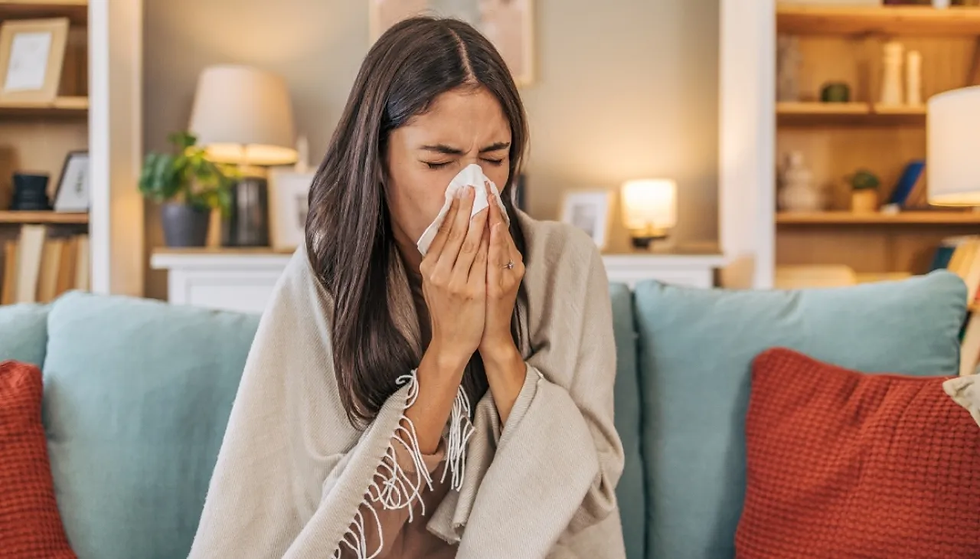2025 Flu Season Symptoms: The New Signs, Why Women Are Hit Hardest and What to Do if You Get Sick
- Woman's World
- Nov 15, 2025
- 3 min read

Every year in the fall, you start getting messages from your local pharmacy about coming in for a flu shot. Indeed, while getting a flu vaccine is super important to staying safe and healthy during the colder season when respiratory illnesses run rampant, knowing how to recognize flu symptoms and when you need treatment can also help protect you. Here’s everything you need to know to prepare you for the 2025 flu season.
What is the flu?
“Influenza, aka the flu, is an infection of the nose, throat and lungs caused by the Influenza type A or B viruses,” says Simran Malhotra, MD, the founder of Wellness By LifestyleMD in Bethesda, MD. According to the Centers for Disease Control and Prevention (CDC), the flu virus is a contagious illness believed to be spread from person to person through the tiny droplets made when you cough, sneeze or talk.
2025 flu symptoms to watch for
Even though the flu does tend to come on strong, flu symptoms can be subtle at first for some people. “Initially, people may feel some mild fatigue, achy muscles or just feel a bit “off”, things that may be mistaken for the after effects of a stressful day or hard workout,” Dr. Malhotra says. Symptoms can quickly progress from there, though. Per the CDC, the most common flu symptoms for 2025 include:
Fever or feeling feverish
Cough
Runny or stuffy nose
Muscle or body aches
Headache
Fatigue
Vomiting and diarrhea (this is more common in children than adults)
What are your go-to self-care remedies when you have the cold or flu?
Rest and extra sleep
Getting more fluids (like water, tea and soup)
Over-the-counter meds
Home remedies (like honey and ginger)
I just try to power through
Women may be prone to more severe flu symptoms
Worth noting: Your sex and age can influence how you experience flu symptoms. “There is some research that suggests women may experience more severe symptoms due to a stronger immune response, potentially from the impact of estrogen,” explains Dr. Malhotra.
Likewise, your response to the flu can become more severe as you age. “As people get older, especially over 65, their immune system weakens, making them more susceptible to flu-related complications like pneumonia and hospitalization,” Dr. Malhotra says. “For people with weakened immune systems, classic flu-like symptoms may be absent. They may present with generalized weakness, confusion or worsening of other underlying chronic conditions.”
How is this year’s flu strain different?
The CDC recently released its outlook for the 2025 to 2026 flu season, predicting that it will be moderate severity in terms of the number of illnesses, hospitalizations and deaths from influenza viruses. A key part of this prediction is that last year’s flu season was ultimately classified as high severity, and the United States has not experienced back-to-back high-severity flu seasons since the CDC began measuring the severity of these illnesses in 2003.
Of course, a key part of making this prediction come true is the assumption that the majority of people will get a flu shot before the season begins in full swing.
Is it the flu or a cold?
There are two main ways in which symptoms of the flu and the common cold differ. First is how they appear. “Flu symptoms typically start suddenly and tend to feel more severe, whereas the common cold starts more gradually and symptoms tend to be much milder,” Dr. Malhotra says.
While some symptoms overlap, the symptoms you experience can also clue you in as to whether you have a cold or the flu. “With a cold, runny nose, sneezing and sore throat are common,” says Dr. Malhotra. “With the flu, you can expect high fever, fatigue, chills and muscle and/or body aches.” (Learn how cold and flu symptoms differ from those of the 2025 COVID ‘stratus’ strain.)
What to do if you’re experiencing flu symptoms
If you start to notice the flu symptoms above and you’re generally healthy, there’s no need to panic. “Most healthy people will improve with supportive care such as rest, hydration and fever and pain medications,” Dr. Malhotra says.
But if things start to progress, it’s worth giving your doctor a call. “It is recommended to seek medical attention if you have any alarming symptoms such as difficulty breathing, confusion, chest pain or you are unable to keep fluids down,” says Dr. Malhotra.
She adds that people who have a higher risk for flu complications, such as adults over 65 and people who are immunocompromised or have existing chronic health conditions, may need to be hospitalized if their symptoms start to become serious. “Just like with the common cold, practice good hand washing, wear a mask and avoid socializing to prevent further spreading of the flu,” Dr. Malhotra advises.
More ways to stay healthy:




















Comments